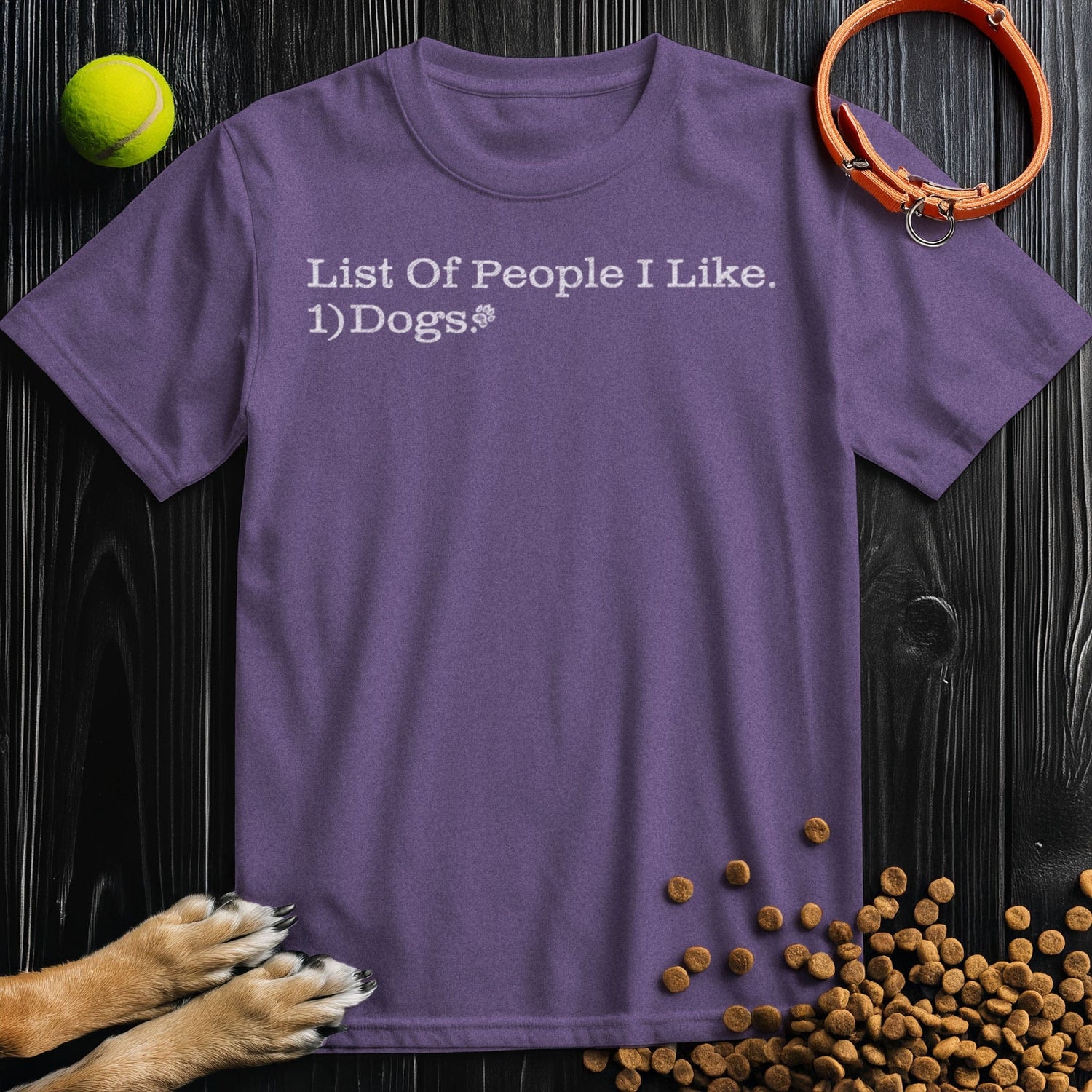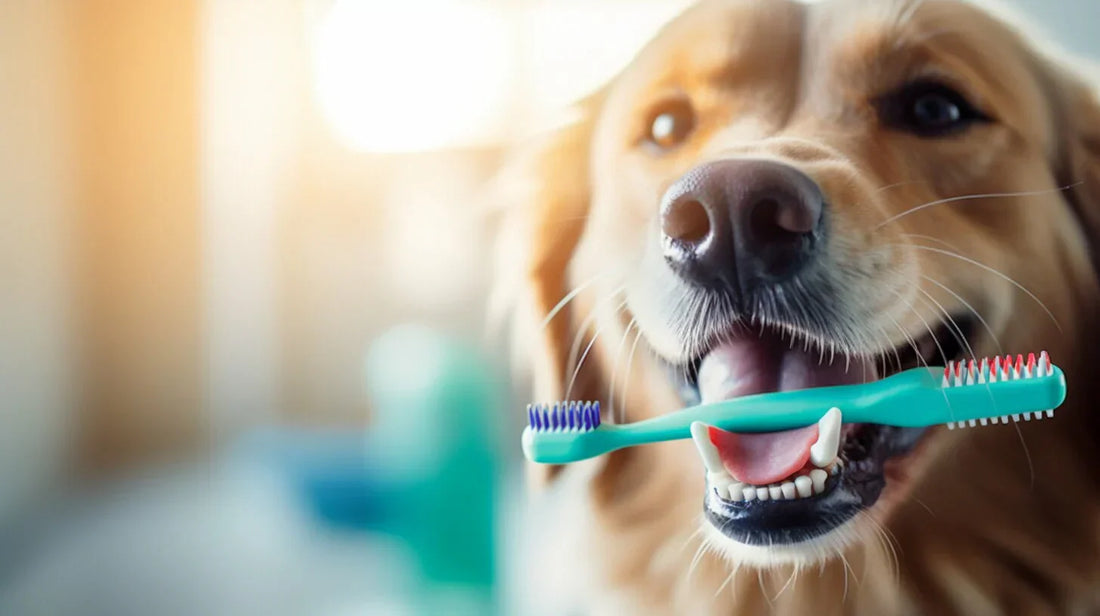Welcome to our comprehensive guide on dog dental care! As a responsible pet owner, it's important to prioritize your furry friend's oral health to ensure they live a happy, healthy life. Poor dental hygiene in dogs can lead to various diseases, including gum disease and tooth decay. In this article, we will highlight the need for regular dental care and provide expert advice on maintaining your dog's oral hygiene. We will also cover products and tips to make the process easier for both you and your furry friend.
Key Takeaways:
- Dog dental care is essential for the overall health of your pet.
- Regular dental cleanings can prevent dental diseases such as gum disease and tooth decay.
- Brushing your dog's teeth at home is an effective way to maintain oral hygiene.
- There are various dental care products and treats available to supplement regular brushing and professional cleanings.
- Identifying signs of dental problems in dogs and seeking veterinary care is crucial for their well-being.
Understanding Canine Oral Hygiene
Dog dental care is an essential aspect of pet care that should not be neglected. Poor oral hygiene in dogs can lead to various dental diseases, including gingivitis, periodontitis, and tooth loss. Understanding the basics of canine oral hygiene can help pet owners maintain optimal dental health for their furry friends.
The Anatomy of a Dog's Teeth
A dog's teeth consist of four types: incisors, canines, premolars, and molars. Each type plays a different role in biting, chewing, and tearing food. Incisors are located in the front and are used for grasping and nibbling. Canines are located next to the incisors and are used for ripping and tearing. Premolars and molars are used for crushing and grinding. Dogs have 42 teeth as adults, with puppies having 28 temporary teeth that fall out as they grow.
Common Dental Issues in Dogs
Dogs are prone to various dental issues that can affect their overall well-being. Some common dental problems in dogs include:
- Gingivitis: This is the inflammation of the gums and is caused by plaque buildup on the teeth.
- Periodontitis: This occurs when gingivitis is left untreated, leading to the destruction of the supporting tissues of the teeth.
- Oral tumors: These can develop in the mouth and affect the teeth and surrounding tissues.
- Fractured teeth: This can be caused by trauma to the mouth or from chewing hard objects.
- Malocclusion: This refers to misaligned teeth or jaws and can lead to dental problems and difficulty eating.
Regular dental care and professional check-ups can help prevent and identify these issues early on.
The Importance of Dental Cleaning for Dogs
Just like humans, dogs require regular dental cleaning to maintain good oral health. At-home care, such as brushing your dog's teeth and giving them dental chews, can help prevent tartar buildup and tooth decay. However, professional dental cleanings are also crucial for ensuring your dog's teeth and gums remain healthy.
Professional dental cleanings for dogs are typically performed by a veterinarian under general anesthesia. This allows the veterinarian to fully examine the dog's teeth and gums and use specialized tools to clean and polish the teeth. Anesthesia ensures that the dog is relaxed and comfortable during the cleaning process and also prevents them from moving while the vet is performing the procedure.
It's recommended that dogs receive professional dental cleanings at least once a year. However, the frequency may vary depending on the individual dog's dental health needs. Your veterinarian will be able to provide guidance on how often your dog should receive a professional cleaning.
| Benefits of Professional Dental Cleanings for Dogs |
|---|
| 1. Early detection of dental issues: A professional cleaning allows the veterinarian to examine the dog's teeth and gums for any signs of dental diseases such as tooth decay, gum disease, or oral tumors. Catching these problems early can prevent them from progressing and causing further health issues for the dog. |
| 2. Thorough cleaning: While at-home dental care can help remove some plaque and tartar buildup, only a professional cleaning can fully remove all the buildup that may have accumulated over time. This helps prevent dental issues and keeps the dog's teeth and gums healthy. |
| 3. Improved overall health: Good oral health is linked to good overall health in dogs. Regular dental cleanings can help prevent the spread of bacteria from dental diseases to other areas of the body, such as the heart, kidneys, and liver. |
If you're unsure about whether your dog is due for a professional dental cleaning, be sure to consult with your veterinarian. They will be able to assess your dog's dental health and recommend the appropriate course of action.
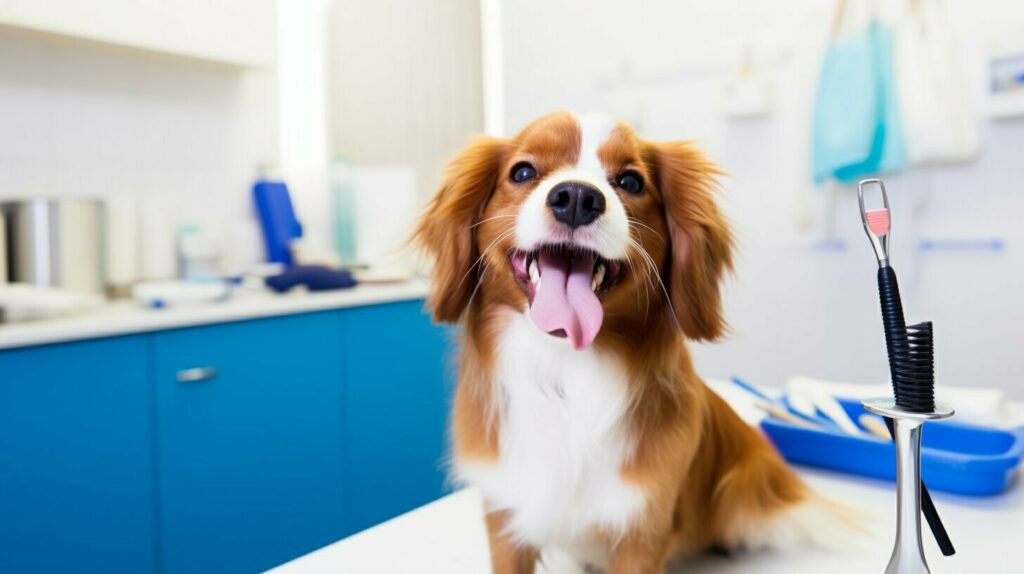
Tips for Brushing Your Dog's Teeth
Regular brushing is essential to maintain your dog's dental hygiene. Here are some tips for brushing your dog's teeth:
- Use a toothbrush and toothpaste specifically designed for dogs. Human toothpaste can cause stomach upset.
- Introduce the toothbrush gradually. Let your dog sniff and lick the toothbrush to get familiar with it.
- Start with small sessions, gradually increasing the time and frequency of brushing.
- Brush your dog's teeth at a 45-degree angle, using gentle circular motions on the gum line.
- Be sure to brush the back molars where plaque and tartar tend to accumulate.
- Use positive reinforcement, such as treats or verbal praise, to make brushing a positive experience for your dog.
- If your dog is resistant to brushing, try using dental chews or toys as an alternative.
Remember to always consult with your veterinarian for additional advice and recommendations on brushing your dog's teeth.
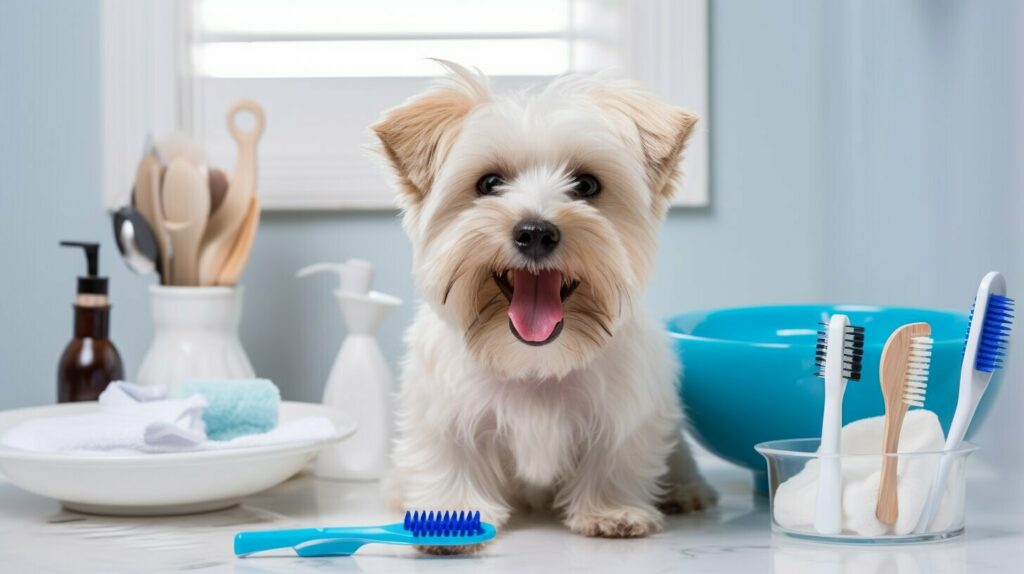
Other Dog Dental Care Products
In addition to regular brushing and professional cleanings, there are a variety of dental care products available for dogs that can help maintain their oral hygiene. These products can provide additional support in preventing dental diseases and keeping your furry friend's teeth healthy.
Dental chews and treats: Chewing is a natural behavior for dogs that can help clean their teeth and promote healthy gums. Look for dental chews and treats that are specifically designed to reduce plaque and tartar buildup. Make sure to choose appropriate sizes based on your dog's weight to prevent choking hazards.
Dental toys: Toys that are designed to promote dental health can be a great addition to your dog's playtime. These toys can help clean teeth, massage gums, and freshen breath. Look for toys made from durable materials that can withstand rough play and do not pose a choking hazard.
Water additives: Water additives can be added to your dog's drinking water to help fight plaque and freshen breath. These additives usually contain enzymes or other ingredients that promote oral hygiene. Make sure to follow the recommended dosage guidelines, and do not use if your pet has any underlying health conditions.
Remember, while these products can be beneficial for your dog's oral health, they should not replace regular brushing and professional cleanings. A comprehensive dental care routine should include a combination of these products, along with regular check-ups with your veterinarian.
Signs of Dental Problems in Dogs
Keeping an eye out for signs of dental problems in your dog is essential to maintaining their oral health. Early detection of dental issues can prevent more serious complications down the line. Here are some common signs that your dog may be experiencing dental problems:
- Bad breath
- Excessive drooling
- Loss of appetite or difficulty chewing
- Bleeding or swollen gums
- Loose or missing teeth
- Discolored or tartar-covered teeth
If you notice any of these signs, it's important to take your dog to the vet for a dental exam. The vet may recommend a dental cleaning or further treatment to address any issues that are discovered.
"By the time a pet owner realizes their dog has dental issues, it’s often pretty severe," says veterinary dentist Dr. Brook Niemiec. "Pets are very good at hiding their pain.'
Regular dental check-ups and cleanings can help prevent dental problems from developing or worsening, so keeping up with your dog's dental care routine is crucial. Additionally, providing dental chews or treats and avoiding hard or chewy toys can help maintain your dog's oral hygiene between professional cleanings.
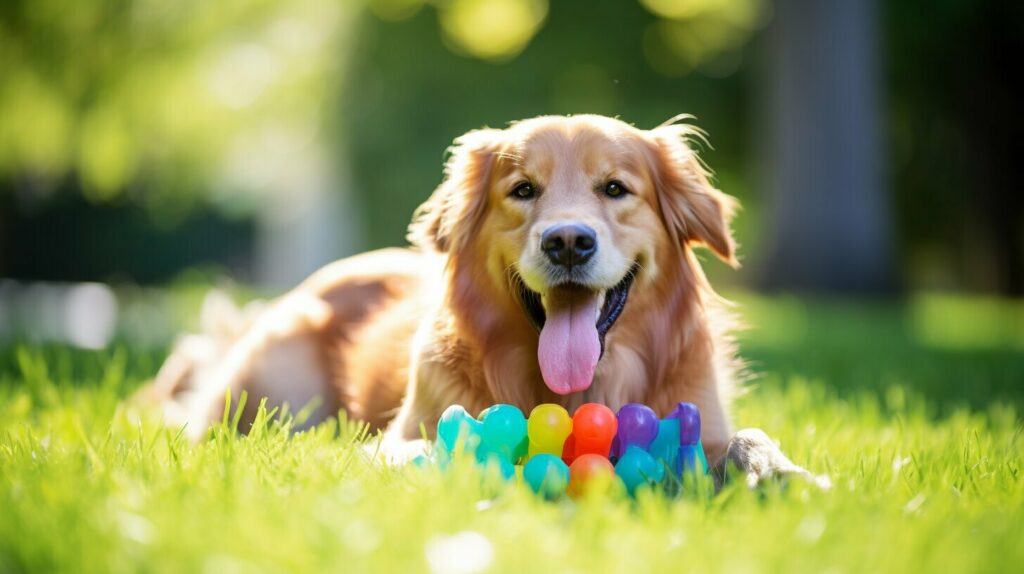
By staying vigilant and taking action if your dog displays any of these signs of dental problems, you can help ensure they maintain optimal oral health.
Maintaining Good Dog Dental Hygiene Habits
Establishing and maintaining a regular dental care routine for your dog is crucial for their overall health and well-being. Here are some tips to help you maintain good dog dental hygiene habits:
- Brush your dog's teeth daily using a toothpaste specifically designed for dogs. Use a soft-bristled toothbrush and make sure to brush all of their teeth and gums.
- Make tooth brushing a positive experience for your dog by rewarding them with treats or praise. Start with short sessions and gradually increase the amount of time spent brushing.
- Include dental chews and toys in your dog's routine. These products can help remove plaque and tartar buildup and promote healthy chewing habits.
- Monitor your dog's diet and avoid feeding them table scraps or sugary treats. A healthy diet can help prevent dental issues and promote overall health.
- Schedule regular veterinary check-ups and dental cleanings to ensure your dog's teeth and gums are in good condition. Your veterinarian may also recommend specific dental care products or strategies for your dog.
By incorporating these habits into your dog's daily routine, you can help maintain their dental health and prevent dental diseases. Remember, a healthy mouth leads to a healthy dog!
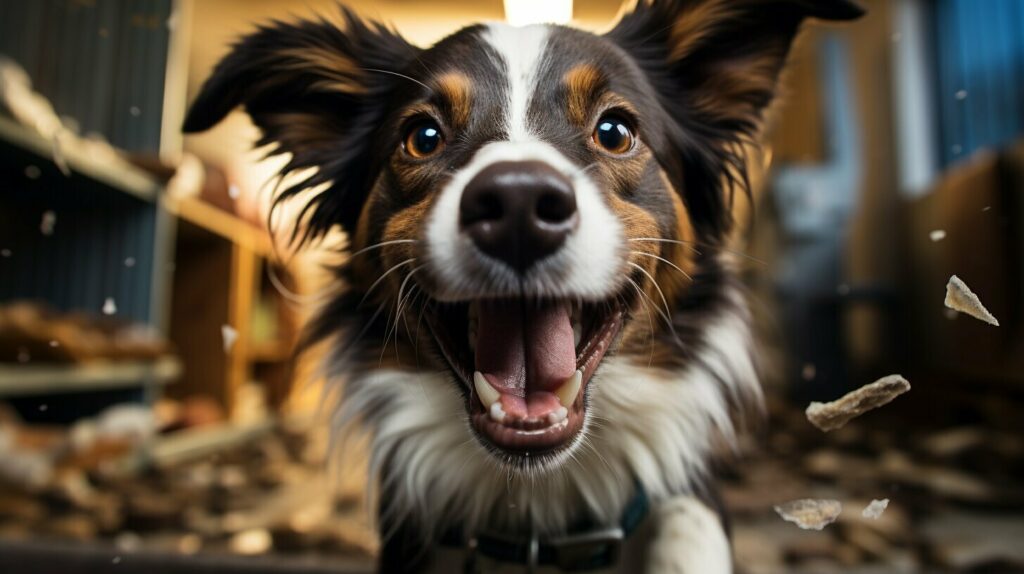
Professional Dental Care for Dogs
Regular dental exams and professional cleanings are crucial for maintaining optimal oral health in dogs. Just like humans, dogs can develop dental issues that require the intervention of a veterinary professional.
During a dental exam, a veterinarian will assess the dog's teeth and gums, checking for signs of decay, infection, or other problems. If any issues are identified, the veterinarian may recommend a dental cleaning to remove plaque and tartar buildup.
Dental cleanings for dogs typically involve the use of anesthesia to ensure the pet remains still and comfortable during the procedure. The veterinarian will clean the teeth thoroughly, using special tools to remove buildup and polish the enamel.
After the cleaning, the veterinarian may provide recommendations for at-home dental care and schedule follow-up appointments as necessary.
It is recommended that dogs receive professional dental cleanings at least once a year, although some pets may require more frequent cleanings depending on their individual needs.
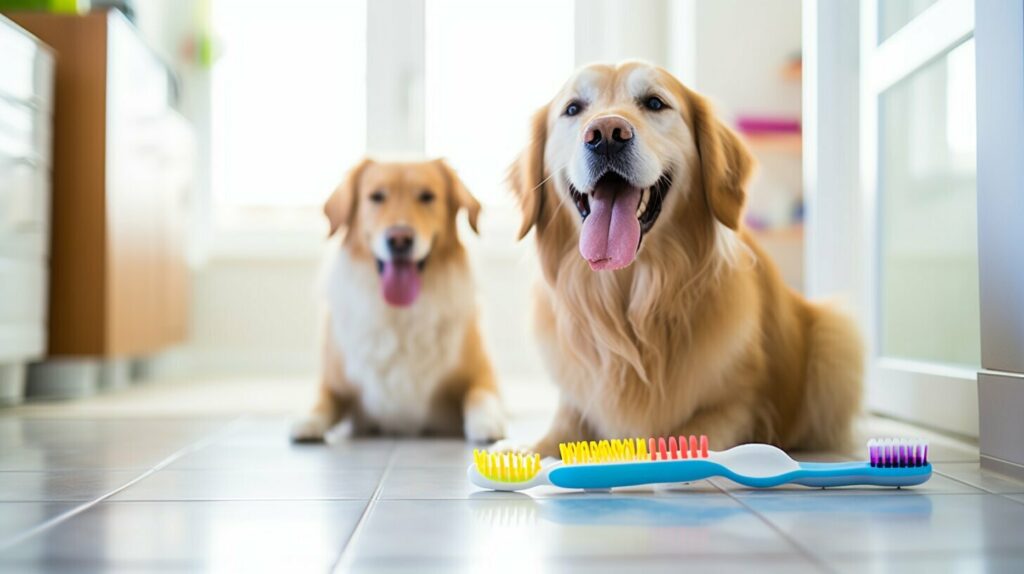
"Regular dental check-ups and cleanings can help prevent dental diseases in dogs and keep their teeth and gums healthy."
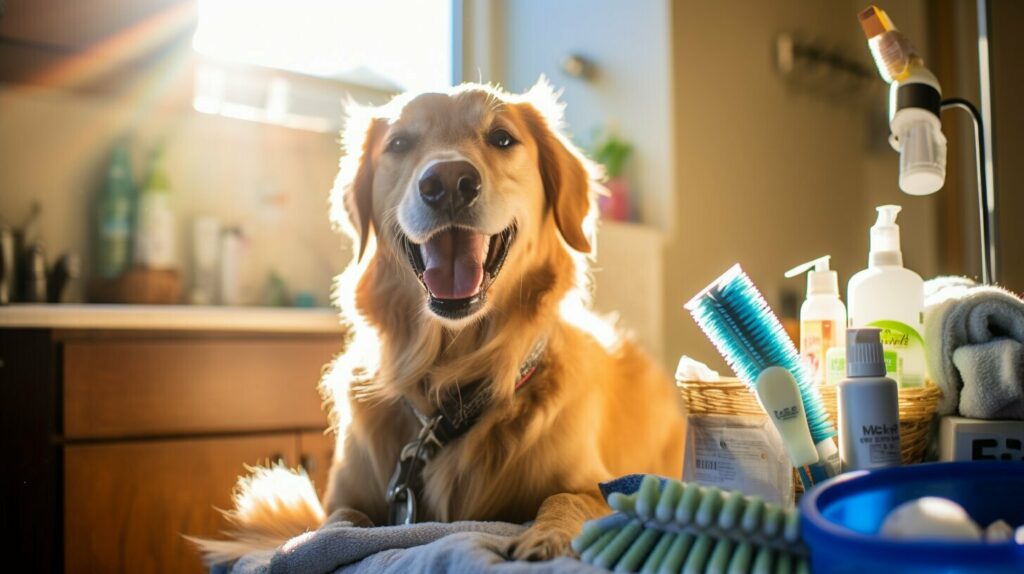
Conclusion
Dog dental care is an integral part of overall pet health, and neglecting it can lead to serious dental problems. By incorporating regular dental care routines at home, including brushing your dog's teeth and using recommended dental products, you can help prevent dental issues in your furry friend. Regular veterinary checkups and professional dental cleanings can also play a vital role in maintaining optimal oral health.
Remember to stay vigilant for signs of dental problems in your dog, such as bad breath and swollen gums. Don't hesitate to seek veterinary care if you observe any of these symptoms.
Take Action Now!
Start your dog on a dental care routine today to ensure that they live a long and healthy life. Prioritize their dental health by maintaining an oral hygiene routine, and don't forget to schedule regular checkups with a veterinarian for professional cleanings and care. Your furry friend will thank you!
FAQs about Dog Dental Care
Q: How often should I brush my dog's teeth?
A: It is recommended to brush your dog's teeth at least 2-3 times a week to maintain good oral hygiene.
Q: What type of toothbrush and toothpaste should I use for my dog?
A: Use a toothbrush specifically designed for dogs, with soft bristles to avoid gum irritation. Use dog-friendly toothpaste, as human toothpaste can be harmful to dogs.
Q: My dog doesn't like having its teeth brushed. Any tips?
A: Start by introducing your dog to the toothbrush gradually. Use positive reinforcement and reward them with treats. You can also try using dental wipes or dental sprays as an alternative.
Q: Are dental treats and chews effective for maintaining dental health?
A: Dental treats and chews can help reduce plaque and tartar buildup. Look for products approved by veterinary dental associations and choose the appropriate size and texture for your dog.
Q: What are the signs of dental problems in dogs?
A: Common signs include bad breath, swollen or bleeding gums, yellow or discolored teeth, excessive drooling, and difficulty eating or chewing. If you notice any of these signs, it's important to consult your veterinarian.
Q: How often should my dog have a professional dental cleaning?
A: The frequency of professional cleanings depends on your dog's individual needs and oral health. Typically, dogs need professional dental cleanings annually or biannually.
Q: Can dental care prevent other health problems in dogs?
A: Yes, maintaining good dental health can help prevent other health issues such as heart disease and kidney problems. Regular dental care is an essential part of your dog's overall well-being.
